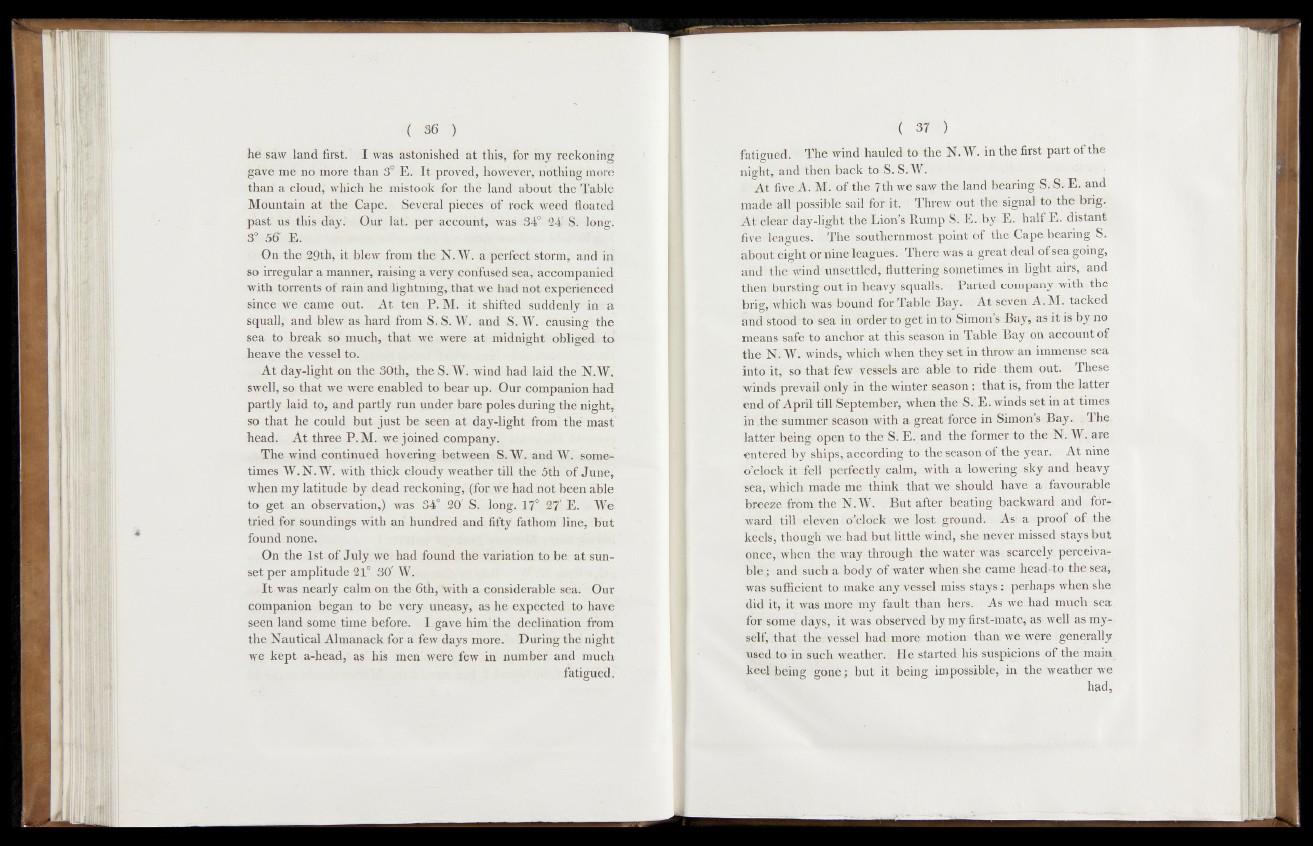
hé sàw land first,. I was astonished at this, for my reckoning
gave-me no more than 3°ÎE; I t proved, however,- nothing more
than a cloud,' which-he mistook -for the land' about thé Tablé
Mountain at the Cape. Several pieces' of rock weed floated
past us this day.: öjir lat. .per-account, was 34° 24'-S>:iilong.
39 56" E.
On the 29th, it blew from' th eN . W. a.perfect storm; and in
so irregular a mariner, raising à verynonfused sea, accompanied
with torrents o f rain and lightning, that we had not expèiaënced
since we came OutJ At ten P. M. if ■ shifted, suddenly in a
squall,’ and blew'as hard from W. and S. W. causing the
seâ: to break so much, that we were at midmght obligëêL fo
heave thé vessel to.
At day-light on the 30th,. lhefk W. wind haeLlaid the^S-W.
swell, so that we were enabled to bear up: .Our companion had
partly laid raw and partly run under bare poles during'thé nighty
so .that 'he could but just be seen at day-light from' the mast
head. At three P.M. wcjóined company. *
: The wind continued hovering between-; S. W. and "V\t. sometimes
W. N.W. with thick cloudy weather till thé 5tói 'of.June,
when my latitude by..dead reckoning,' (for,.we had not been able
to get an observation,) was 34° 20'. S. long. 17° |É | E. ..-Wé
tried for soundings with an hundred and fifty fathom line, but
found none.
jri On' the J s t of July we had found the variation to be at sunset
per amplitude 21° 30' W.
I t was nearly calm on the 6th, Vith a considerable sea. Our
companion began to be -very uneasy, as ,he expected to have
seen land some time before. I gave. him' the declination from
the Nautical Almanack for a few days more." Curing the night
we kept a-head, as his men were few in numbèr and much
fatigued.
fatigued. The' wind hauled to the N.W. in the first part of the
night,: an d th en back toS . S. W.
. At five A. M. OfrthetTth we, say the land bearing S. S.-E., and
made alkpossible- sail forfit. Threw out the signal to the brig.
At.clearf-'day-li'ghtijthedLion’s Rump Sc E.:by E. half E. distant
five-dea.gue‘s. i'Sdfetsontheminost,poiiMrof fhc.Cape bearing S.
about eight or nine leagues. There was a great'deal ofsea going*
andtthe wSndsunsefefeled, fluttering sometimes in light, airs, and
theri'bursting out in'heavy’.squalls.- Parted-company with the
brig, which was bound'for .Table Bay: h AtosevesbteA.M. tacked
and-Stood1 to,1 sea in orderiO gMUnl^ii Simon's Bay, as it is by no
meahswsdfe' to anchor at this* season in Table. Bay *©nt account of
thenN.W. windsp which when they set ;in throw an, immense sea
into i t ; ’ so1 that' fe#- vessels are able! to ride, them but. These
winds 'pre v ail -only in the winter season ; that is, from the latter
end,of April till September, when the S..E. winds set in at,.times
in Jhd surn'ineoseason with a great-force in Simon’s.Bay. | The,
dlftbriibei'ngj upemfo the- Si E. and the'forrneroto/sthe N. WVare
entered'"by sfepa|: according to4 the season of the year.. At nine
o’clock it fell perfectly calm,, with a lowering »sky and heavy
sea* which made me think that we should have a favourable
breeze from the N.W. But after beating backward and ..for?*
ward, till «-eleven o’clock welosk, ground. As: a proof pf, f he
fcfesi* though we had but little wind,; she never,' missed. stays but
puce,when, the way through, the water;wa!sjjjjjscarcely.,percejya-
bfefe and such a body.of water when she came.head.-to the.sea,
wa's sufficient to make any vessel -miss stays«: perhaps when.she
did itj.it was more my fault than- hers. As y e had much sea.
for* some , ddys,‘ d t was observed by my first-mate, as,, well as my^
self, .thatjj thestwessel hadi more1 'motion: than we4were j generally
useditor-in- such weathofl. He. started his suspicions of the main
keeh being gone, s,. but it being impossible^1 in the weather we
had,